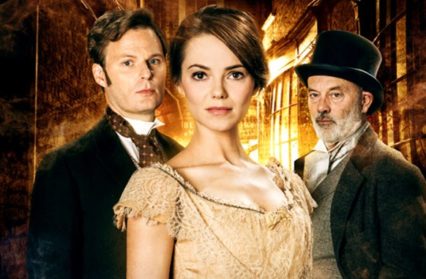Heralded as “a study in sustained terror”, Patrick Hamilton’s 1938 play and its subsequent film adaptations were so psychologically defining as to become its very own definition of the horror contained within. Anthony Banks’ Gaslight is an elegant horror, perfectly aligned with its Victorian setting; provoking a deep, permeating terror, and featuring high drama without ever becoming sensationalist. The atmosphere within the theatre teeters on a knife’s edge amidst Ben and Max Ringham’s eerie musical compositions.
The play is tightly constructed, almost constantly in motion, and heavily reliant on the actors’ superb sense of timing to successfully execute the fast-paced exchanges. Sound effects and props are used to great effect; a gently ticking grandfather clock heightening the tension, in a way complete silence would have failed to do. These clock-filled silences act as their own piece of dialogue, rather than allowing a break in the mounting suspense. Humour is cleverly woven throughout, in such a way as to momentarily ease, rather than dissipate the deliciously rising tension. The arrival of retired police detective, Rough (Keith Allen), enables the introduction of a small element of farce, which Allen adroitly handles, shifting between this and the far more refined humour of clever wordplay.
Bella Manningham’s contradictory essence is well captured by Kara Tointon, who is both submissive and defiant, obtuse and perceptive, fearful and courageous. At times, Tointon’s physical portrayal of Bella’s deference to her husband is overemphasised, in her persistent bent posture, but she succeeds in retaining an admirable streak of resilience, in the face of the tormenting Mr Manningham. On the surface, Rupert Young is convincing as the cruelly manipulative Jack, condescendingly indulgent one moment, flying into a fit of exasperated rage the next. Yet, Young fails to emote a sense of real menace to underpin the performance, and turn Jack from villain into something truly terrifying.
The real horror of Gaslight, however, is the relevance it still has in today’s society. Exchange David Woodhead’s gorgeous period set for a modern visage, and many aspects of the story retain their plausibility. The level of domestic abuse women are still enduring is unforgivable; some men choosing to self-validate at the expense of women’s self-esteem. Despite the play being almost seventy years old, only two years ago, a law was passed rendering controlling or coercive behaviour punishable by a prison sentence. The law itself is progress, but its necessity and the length of time it has taken to be realised, is far from indicative of a progressive society.
Gaslight pushes this form of mental and emotional abuse to the extreme, but the behaviours exhibited by Jack Manningham are appallingly common. His treatment of Bella as a possession, controlling nature and lack of respect for women, are traits that have endured for far too long. The fact feminism is still a current issue, is deplorable. That humanity should ever have required a movement to achieve equal rights between the sexes, let alone that the struggle is still ongoing, remains indefensible. To those who would argue feminism is no longer necessary, they need only consider the current American president, to know we are far from achieving equality.
Bella Manningham is a fictional reflection of a very real tragedy, and one we must continue to strive to extinguish.












